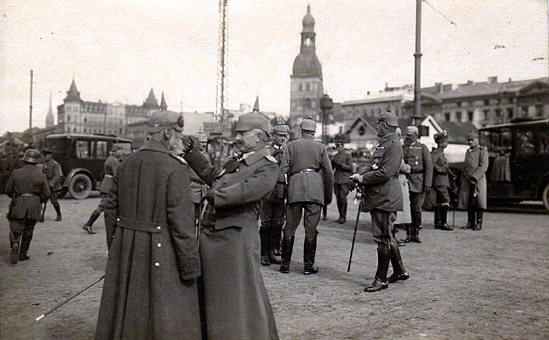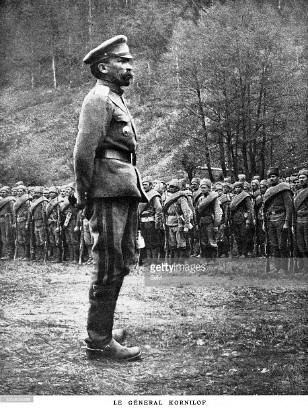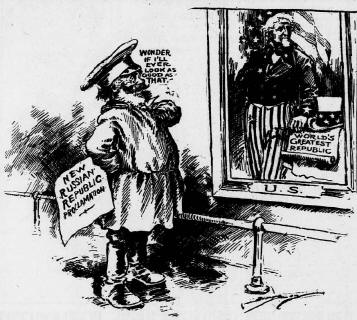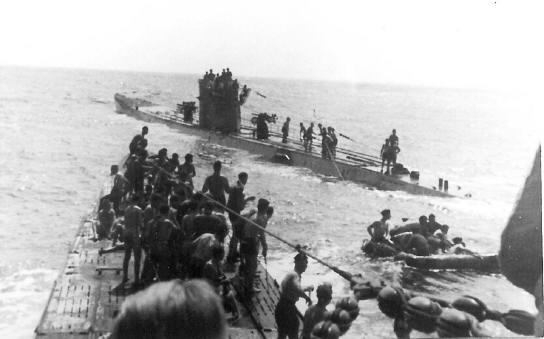|
The Great War
News Reports From the Front
100 Years Ago This Month
September 1917
Russia descends into chaos
September 7
In response to questions regarding plans for a winter campaign, Maj. Gen. Pershing declared "the American people must learn the meaning and value of patience, and not to expect that the expeditionary forces that landed in Paris can be rushed immediately to the front-line trenches. To put an inadequate, insufficiently supplied
force into actual combat," he said, "would merely be making a mistake, which the Germans unquestionably have hoped and expected the United States would make. When America does take her place in the line, shoulder to shoulder with the other allies next year, she will be fully prepared to go through the summer campaign and make the Germans feel the
full weight of her military power.
"Those of us who have fully studied the situation and know what is necessary to be done," said Gen. Pershing, "are anxious that the troops at home shall strive to realize the immensity of the task in which we are engaged, and shall, through patience and confidence, help us to accomplish that task in the shortest possible time.
"We came into the war without an Army. We have always been a peace loving people, and undoubtedly the great majority of us hoped we should be spared war. So now we must build an entire new organization, and build it so big and so strong that we can take our place along with our allies, who already have had three years time and
experience."
"I realize how very difficult it is for the people at home to visualize the war, to visualize the effort that lies behind the war. Our problems are greater than any France or Great Britain had to solve, but we are solving them and will continue to do so."
"It is impossible to create a vast fighting machine merely by the wave of a wand. I wish that it were possible to do so and that we might be fighting the Germans this minute. We know that the only way to defeat the German Army is to hammer it and keep on hammering it. That is what we expect to be doing with all our fresh
strength and enthusiasm during next year's campaign. But until we can properly take our place in the line, the people must be patient and as confident as we are; we know what we are doing and what we must do."
After a week of comparative inactivity along the Western Front numerous signs of a revival of fighting are appearing. In preparation for an Allied push, the Germans are reported to be removing the civilian population from districts extending twelve miles or more to the east of the present front in West Flanders. One theory for
the reported evacuation is that the German command, dreading the effects of the next drive, is preparing to flood the lowlands, thus blocking any movement by the Allies. Another supposition is that the Germans, lacking the manpower to hold the present line firmly enough, are preparing for another strategic retreat.
Meanwhile, on the Eastern Front, German troops have crossed the Dvina River, Southeast of Riga and are advancing in a northerly direction. In response, the Russians have withdrawn from Riga.
With Riga abandoned and the potential German occupation of Petrograd looming, the seat of the Russian provisional Government undoubtedly will be moved to Moscow. Much as they may regret seeing the Russian capital occupied by a German army, the forward thinking men of Russia, working to set up a government, may regard it as a
blessing in disguise.
There are many advantages to moving the Russian capital to Moscow. It is held in almost religious-regard by the Russian population as the ancient capital of the old empire, surrounded with traditions of Russia's greatness - the triumphs of Alexander, Catherine and Peter the Great.
Furthermore, some of the members of the new government are said to think the German occupation of Riga and Petrograd might be a wholesome lesson for the radical elements which have been hampering the new government, and that experience under the military heel of Germany might convince them of the need to support the government
as now constituted to save their Fatherland for the Russians.
Those disposed to regard the extension of the German lines further into Russia as being of any little military gain to Germany, recall the old adage that King Winter was too much for Napoleon. They point out that Germany only takes on the task of caring for an army frozen in far from base. Instead, they believe Germany’s chief
objective is the effect on the political situation in Russia.
The possible ultimate military consequences of the loss of Riga are difficult to estimate. The right flank of the entire Russian Western Front was anchored on the Gulf of Riga. It is too early to see if the Germans will be content with the occupation of the Baltic Sea port the Russians have left them, or, if an attempt will be
made to swing back the entire Russian line on this front, creating an opening for an operation with Petrograd as the objective.
Riga had a population of more than 500,000 persons before the war, and aside from Petrograd, is the most important Russian commercial city having access to the Baltic. It had a large German population before the opening of hostilities and was founded in 1155 by German merchants. The city passed through the control of various
northern nationalities during the centuries and finally, in 1721, it was incorporated into the Russian Empire.
The Germans long have had their eyes upon Riga. At the close of the great campaign of 1915 when Poland was overrun, an extraordinary effort was made by Field Marshal Hindenburg to advance towards Riga. The Russians at that time, however, were able to hold their grip, being aided by the advent of winter.
A leading German military expert considers that with the capture of Riga, operations on the Riga front have ended. It is considered too late in the year to advance further, as that would require the construction of new roads and the establishment of depots. The approach of the wet and cold season militates against a real push
towards Petrograd at present, it is held, even if Hindenburg had the men to spare for the difficult task.

The Kiser and senior staff tour Rega after its capture by the Germans
September 14
Russian Premier Kerensky has declared that a state of war exists in Petrograd. He has ordered Gen. Korniloff, the Commander-in-Chief of the Russian armies, to resign, in consequence of Gen. Korniloff’s demand for supreme power.
 Members of the Russian Cabinet today told the Associated Press that the Provisional government regarded Gen. Korniloff’s demand as an act of rebellion, which must be ruthlessly suppressed. The Soldiers and Workmen’s body, has ordered all Army
organizations to obey the Provisional government against the conspiracy, stating that Gen. Korniloff will be punished for treachery. Members of the Russian Cabinet today told the Associated Press that the Provisional government regarded Gen. Korniloff’s demand as an act of rebellion, which must be ruthlessly suppressed. The Soldiers and Workmen’s body, has ordered all Army
organizations to obey the Provisional government against the conspiracy, stating that Gen. Korniloff will be punished for treachery.
In response to repeated questions Kerensky issued the following statement:
"On September 8, a member of the Duma called upon me, in the name of Gen. Korniloff, to hand over all civilian and military powers to the generalissimo, who would form a new government at his pleasure. The authenticity of the summons was afterwards confirmed by Gen. Korniloff himself, who had a conversation with me over the
direct telephone wire."
"The summons, addressed through me to the Provisional government, was an attempt by certain quarters to profit by the difficult situation of the country and establish a state of things contrary to the revolution. In response, the Provisional government has charged me to take all urgent and indispensable measures necessary to
cut out this root of evil against the supreme power and rights of the citizens won by the Revolution."
"I, therefore, have ordered Gen. Korniloff to hand over his functions to Gen. Kiembevask, Commander-in-Chief of the Armies of the Northern Front. Second, I declare a state of war in the town and district of Petrograd. I appeal to all citizens to remain calm, and maintain the order necessary for the welfare of the Fatherland."
Russian embassy officials believe that the actions of Gen. Korniloff were motivated by elements of the Council of Workers and Soldiers delegates opposed to enforcement of the death penalty for mute soldiers. Representatives of the Workmen and Socialist Soldiers and the Kerensky Cabinet, it was pointed out, had been
dissatisfied with these stringent measures adopted to restore the Russian Army to discipline, fearing the power might menace the new democratic ideals of the Republic. They insisted that a less drastic disciplinary code would revive more wholehearted support of the Army, and consequently would be more effective.
Following Gen. Korniloff’s order for his troops to march on Petrograd, Government infantry moved out of the capital to oppose them.
Gen. Denikime, Commander of the Russian Armies on the Southwest Front, has telegraphed Kerensky that he intends to support Gen. Korniloff. Gen. Kaledine, Commander of the Cossacks, telegraphed Kerensky threatening that if he does not agree to Gen. Korniloff’s demands the Cossacks will cut the Moscow railway line, thus
isolating Petrograd. Gen.’s Denikine and Valuveff, commanding the Southwest and Western fronts, respectively, have joined Gen. Korniloff.
Gen. Stcherbatcheff, Commander of the Russian forces on the Romanian front, has ordered his armies not to take part in the conflict, remaining true to the Provisional government. The Premier has received a telegram from the Commander of the Baltic Fleet promising support
Premier Kerensky has sent instructions to all railroad organizations, requiring the officials to refuse to obey any orders from Gen. Korniloff, and government officials are tearing up the railway tracks 40 miles north of Petrograd in order to stay the approach of Gen. Korniloff’s troops.
Evidence of the loyalty of the troops and people to the Provisional government is being received from all the provinces, while all public organizations have announced their determination to support the Provisional government by every possible means.
Kerensky, however, is having difficulties within the capital with the Bolsheviks and Maximalists. The Council Soldiers and Workmen Delegates urge that all power should pass into the hands of the Socialists. It was resolved at the meeting, however, that Premier Kerensky should be supported unconditionally and a solution to the
situation should be found which will prevent internal war.
Meanwhile in Germany, difficulties continue to be felt with her inability to supply fuel to its industry and population. The era of voluntary, or compulsory, selection of the fittest establishment for survival in various branches of trade and industry already has opened and businesses will be conducted in these, while others
will be shut down, except those applying heat and light. Butchers will be allowed to keep their places open late two afternoons a week; otherwise they must close with the sun. Jewelers will be allowed to open only on those days when artificial light is unnecessary, which, during the German winter, are very few. Many German cities have already
suspended street lighting entirely on account of the lack of coal.
The German press and public are, for the moment, far more keenly interested in the problems of fuel and food than in politics and developments at the fronts. Farmers are demanding an abandonment of the compulsory administration of crops and the return to the system of commercial supply demand as a sole practice to ensure the
necessary supply for human consumption. Urbanites, on the contrary, maintain that unless the government protects them, humans would get potatoes only at prices impossible for the poor.
September 21
 Gen. Korniloff, leader of the rebellion against the Provisional government has been arrested. The question of the probable fate of Gen. Korniloff is exciting public opinion. Indications are that the government must face serious difficulties over the
matter. Gen. Korniloff, leader of the rebellion against the Provisional government has been arrested. The question of the probable fate of Gen. Korniloff is exciting public opinion. Indications are that the government must face serious difficulties over the
matter.
An interesting feature of the conflict is the credible absence of bitter feeling and clamor for vengeance. Having re-established capital punishment at the front, however, the government, if it spares the rebel Commander, must face the reproach that it executed common soldiers for less serious offenses and it would be virtually
impossible to impose the death penalty in the future. Against this are the facts of Gen. Korniloff’s brilliant service, his chivalrous, and personal character are a happy circumstance that there had been no bloodshed so far.
There are indications that the government is seeking a way out and reports have been circulated that the government has decided not to take extreme measures against Gen. Korniloff, as it does not wish to appear vengeful.
In a note to the Army, Kerensky said that the revolt by Gen. Korniloff disorganized the operation at the front. The Premier instructs the soldiers to resume the transport of troops according to orders of the general staff, and to stop arresting their commanders.
Following the collapse of the rebellion, Kerensky has been busy forming a new Cabinet to govern the country. Newspapers report, however, that difficulties have already arisen. Representatives of the Social Democrats and the Social Revolutionists visited Premier Kerensky with almost identical resolutions declaring that it would
be impossible to join the new Cabinet if Constitutional Democrats were also made ministers. The grounds for this decision are the view of the parties that the Constitutional Democrats as a whole aided with and encouraged Gen. Korniloff.
The newspapers assert that Kerensky is in a very difficult position and that his resignation is not excluded from the possibility. The problem is complicated by the attitude of Petrograd’s Council of Deputies, in which the Bolsheviks, for the first time, gained an overwhelming majority of 279 against 115 in favor of their
extremely radical program.
The Bolshevik’s demand that all representatives of the propertied classes must be excluded from power, as they are merely a cause of counter-revolutionary plotting.
The Bolshevik’s also demand the abolition of private property and land, the transfer to peasants of all stock and machinery on estates, control by working classes over production, the nationalization of all branches of industry, merciless taxation of capital and the confiscation of war profits.
The Bolshevik’s further demand the expulsion of counter-revolutionaries from the command of the Army, the satisfaction of the demands of Ukraine and Finland for independence, and the abolition of privileges of nobles.
Meanwhile, American infantrymen of the expeditionary Army held their first field day today since landing in France. A battalion of infantry Regiment gave demonstrations of machine gun, rifle and bayonet assaults, concluding with a genuine American athletic program, hundred yard dashes, tug-of-wars and boxing bouts.
Several British non-commissioned officers have been detailed to give the American soldiers pointers and machine gun, grenade, bayonet and signal exercises and on delivering gas and liquid fire attacks. Demonstrations are given to the men in the morning and lectures to officers and non-commissioned men in the afternoon.
September 28
Passengers who arrive from England today on an American steamship report that five British steamships out of a convoy fleet of six, which left Ireland September 3, were sunk by German submarines within a few hours of their departure from port.

German submarines resupplying at sea
The five vessels, it was said, convoyed by the destroyers, put to sea shortly after midnight, and were attacked by the mass submarines at daylight the following morning. The news of the disaster was learned when the destroyers, which escaped, returned to port, brought the survivors of the merchantmen back to port.
The closest secrecy was immediately thrown about the incident, a merchant ship officer said. The survivors were given instructions to say nothing about it, and no details as to the names of the ships or the extent of the loss of life could be learned.
Convoying of merchant ships by American and British naval vessels has materially reduced losses from submarine attacks, the Navy Department said. Since the convoy system was adopted, records show the Allies were losing approximately one half of one percent of convoyed merchant craft to German submarines. The figures have not
been worked up for the past week, but indications are that since the American Navy have joined, even this small percentage has been very much reduced.
There have been no recent submarine losses in the vicinity of Gibraltar or the Azores, which tend to support the view that the convoy system is proving itself effective. Some Navy officials believe that the massed attack by six German submarines on the convoys indicates a change in the tactics by the German Admiralty. British
and American naval strategists are working on a method of meeting massed attacks.
Crown Prince Rupprecht of Bavaria, commander of the German Army on the northern end of the Western Front, has issued an order that the First American officer captured on his front should be taken immediately to his headquarters.
Reports that the German military authorities have offered a reward to the first German capturing an American soldier was denied in a statement by the official German news agency. However, the diary of a Prussian Sgt. captured previous to September 15 mentioned that a German general on the Western front had offered for the
First American, dead or alive, 400 Marks or two weeks leave and the Iron Cross of the First-Class as a reward for their capture.
In response, Sen. Clemenceau who recently visited the American Army zone in France, devoted a long article in praise of American soldiers and their chiefs. In the course of the article he related the following antidote: "As I reminded, the Germans had endeavored to ridicule the American Army. Yes they have offered 400 marks,
or $75 and two weeks leave to the German soldier who first captured an American soldier, but all I could do is promise $.10 with a nights rest to the American who first brought me a German prisoner. $.10 is a big price for a Boche, don’t you think so?"
Meanwhile, hard fighting has developed at various points along the front of the new British offensive east of Ypres. Generally speaking, however, the situation on the Western Front remains unchanged, although there has been some slight give and take of more or less unimportant points along the line.
British casualties reported during the month of September a total of 104,598. The severity of the fighting in which the British had been engaged in September is indicated not only by the total casualties of more than 104,000, but, upon comparison with the August figures which were only 59,000. The total compares favorably with
the figure for September 1916, the third month of the Battle of the Somme, where the casualties were 120,000.
Fifteen persons were killed and seventy injured in an air raid on London on Tuesday. Since there was perfect weather for air operations, Londoners expected a visit from German craft, and their expectations were fulfilled. Shortly after eight o’clock guns were heard firing in the suburbs and the city had a repetition of the
experience to which it has become accustomed.
Between eight and nine o’clock the noise of the battle was heard throughout the city. Anti-aircraft guns were being fired from numerous points and bombs could be heard dropping. Searchlights played out over the city and the rocket-like burst of shrapnel furnished an interesting spectacle. The purpose of the Germans,
apparently, was the indiscriminate slaughter of the civilian population. The Germans did not attack any point of military importance, but dropped their bombs, as usual, on the residential districts, mostly upon the dwellings of the poorer classes.
There were unusual scenes in the Underground Railroad stations. Women in evening clothes rub shoulders with workmen homeward bound carrying kids the tools. Many persons sat down on the stairways and read newspapers while waiting for the signal that always cleared. Others sang and some danced. But there was another side of the
picture. Mothers unable to get home or distressed about the safety of their children and wounded soldiers hobbled to places of safety on crutches, attended by their nurses.
One of the most daring escapes from interment camps was affected yesterday at Kegworth, Nottingham. Twenty-two German prisoners disappeared through a tunnel extending from a hat in the camp to appoint outside the barbwire fences. How the tunnel was dug is a mystery. Nine of the prisoners were recaptured. The Germans made dummy
locks of cardboard, substituting them for the locks on the cell doors. Dummy figures to deceive the sentries made from bedclothes and some of their own garments. To make these figures more realistic they were decorated with locks of hair from their mattresses.
Read past editions of News Reports From the Front
Have a newspaper clipping on a event that took place in Emmitsburg?
If so, send it to us at history@emmitsburg.net
|